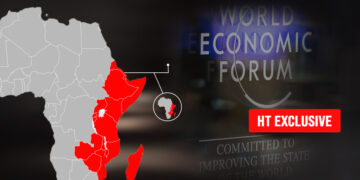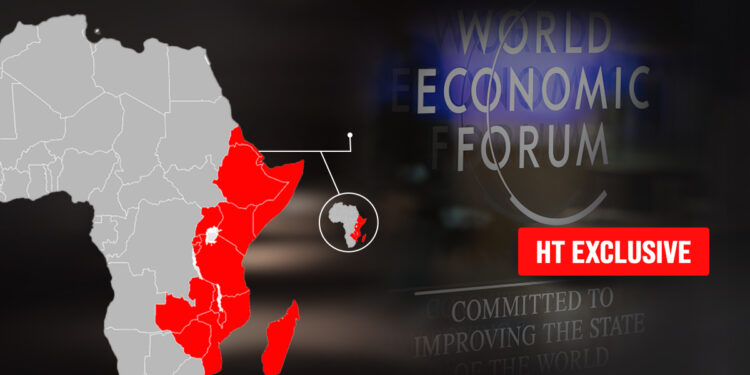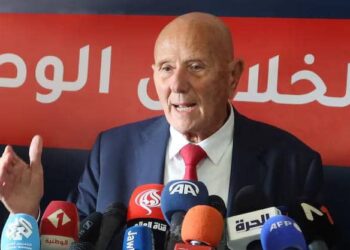By Emmanuel Nduka
Despite a few drawbacks, the African continent remains an attractive investment destination with vast untapped economic potentials. With a young and vibrant population, the continent hosts 17 percent of the world’s entire Gross Domestic Product (GDP). Thus, the continent cannot be ignored.
But Africa must position and market itself strategically to attract more investor funds. At the 2024 World Economic Forum (WEF) in Davos, Switzerland, Kashim Shettima, Vice President of Africa’s biggest economy led the African charge. He touched down the Swiss mountain town with a mandate to “sell Nigeria”, and by extension, Africa “to the world”.
He is already being celebrated for taking his PR and branding talent to higher levels as he led other top Nigerian officials to an entertaining choreography of Kiss Daniel’s ‘Buga’, at the ‘Nigeria Night’ on Wednesday, January 17. The session according to Nigerian authorities, was put together to sell Nigeria to the world.
READ ALSO: NYPF Hails President Tinubu Over Assent To New Student Loans Bill
While some Nigerians took to Twitter, formerly X, to shower Shettima accolades for his strategic move, others are accusing the VP of reneging on his promise, and swapping roles with his principal – President Bola Tinubu. Heritage Times HT recalls that the former had declared prior to their emergence as leaders, that he would tackle Nigeria’s insecurity, while his boss would handle economic matters.
“I have been in the theatre of conflicts for 18 years, I will lead the troops, my principal is an economy wizard who has transformed Lagos into the third largest economy in Africa. He will concentrate on the economy. By God’s grace, I will handle the security, and not only handle the security, I will lead the troops to battle across the length and breadth of this country,” Shettima boasted in August 2022 while he appeared as a panellist at the Annual General Conference of the Nigerian Bar Association (NBA) Lagos.
Away from the glorious Buga rendition, Nigeria’s VP went to Davos for much more serious business. He commendably travelled with a reasonable number of about 4 or 5 aides – a gracious attempt to cut down wasteful spending of public funds. Ministers of Finance Wale Edun; ICT/Digital Economy Dr Bosuin Tijani; Art, Culture and Creative Economy Hannatu Musawa; Petroleum Resources (Oil) Heineken Lokpobiri accompanied the VP to Davos.
AfCFTA Action Plan
Shettima highlighted the importance of multilatertism in a fractured world, and the importance of forming global partnerships, and alliances. Speaking at a breakfast event with African Heads of State to launch the Action Plan for AfCFTA on the sideline of the WEF, Shettima said that the African Continental Free Trade Area (AfCFTA) can potentially raise Africa’s Gross Domestic Product (GDP) by $450 billion in 2035.
The VP emphasised that the positive impacts that the AfCFTA agreement could bring, in terms of increasing intra-Africa trade, is why it must not be allowed to fail. “African trade is to be boosted by 52.3% by 2025. We should increase these targets and look at the trillions of dollars. African countries need to move quickly to iron out whatever agreements and impediments are remaining to ensure free and smooth trade. Issues around rules of origin negotiations must be completed,” Shettima noted.
He suggested that for set objectives to be met, information sharing between the government and private sector players must be optimized and prioritized. He also pointed out that “negotiations have turned out to be too slow, with clashes between national and continental priorities, leading to too few consummated deals between countries since January 2021 to date, looking ahead, there is a need for speed and cohesion among African countries, the idea of AfCFTA must not fail, and there is no room for mediocrity in today’s world.”
Citing examples of trade unions in Europe, the Americas and Asia, the vice president said, “African trade cannot continue to be externalised even though we have increased intra-Africa trade from a mere 7 per cent a decade ago to about 15 per cent today.” According to him, while intra-European trade is around 70 per cent, there is a need for African leaders to do a lot better in organically empowering countries on the continent and solving their own problems, he urged Africa’s private sector players to be proactive in stepping up to the plate to occupy their pride of place in trade on the continent.
Armed with Nigeria’s enviable position as Africa’s largest economy, coupled with ongoing efforts by his boss to diversify the economy and shift the dependency burden away from oil with deeper footprints in technology and the creative sector, among others, VP Shettima earlier on Wednesday, January 17 told foreign investors that the country is on the right path to becoming their delight for serious investments.
Timbuktoo Initiative To Create 10million New Jobs For Young People
Bearing in mind Africa’s youthful demography, the United Nations Development Programme (UNDP) launched the “Timbuktoo” initiative in Davos in collaboration with African countries. The initiative, unveiled during a special session at the WEF, aims to be the world’s largest financing facility, uniting catalytic and commercial capital to bolster Africa’s startup ecosystem. With private venture capital investments in Africa surging six times faster than the global average in 2022, a vibrant youthful population, and expanding tech startups, timbuktoo aims to mobilize US$1 billion to transform 100 million livelihoods and create 10 million new jobs.
The initiative was presented to global corporate leaders and African financial institutions by Rwanda’s President Paul Kagame, Ghana’s President Nana Akufo-Addo, Secretary-General of the AfCFTA Wamkele Mene, and UNDP Administrator Achim Steiner. According to the initiators, the timbuktoo initiative is poised to spark the African Startup Revolution, leveraging Africa’s youth demographic and innovative talents.
Expected to collaborate with governments, investors, corporate bodies, and universities to foster innovation, the initiative targets critical gaps in the African startup ecosystem. As a starter pack, Kagame pledged an immediate contribution of US$3 million to kickstart the timbuktoo Africa Innovation Fund hosted in Kigali, with a billion-dollar target to create opportunities for young people in Africa.
On his part, Akufo-Addo emphasized the need for supportive structures to enable and empower young Africans to create innovative businesses, contributing to job creation and sustainable economic growth. Similarly, Administrator Steiner highlighted timbuktoo as a new development model, focusing on startup-friendly legislation, global-class startup building, de-risking capital, and UniPods (University Innovation Pods) across Africa.
The timbuktoo initiative has a mandate to revolutionize Africa’s knowledge-driven economy, transform ideas into pan-African enterprises, and attract global and local investment. The initiative’s unique design blends commercial and catalytic capital to de-risk private investment, foster a pan-African approach to support startups and strengthen the African ecosystem.
What Africa Must Do To Attract Investors – Standard Bank
At the WEF in Davos, Group CEO of South Africa’s Standard Bank, Sim Tshabalala listed a number of practical approaches African countries can follow to attract the eye of investors.
“First of all, they need to liberalise their foreign exchange markets and interest rates. They can expand the real economy and reduce the parallel economy so they can rake in more taxes. They can also articulate, more clearly, their monetary and fiscal policies,” he said.
Tshabalala also suggested the urgent need to make easy, the movement of goods, people and capital between African countries, including by ramping up the implementation of the AfCFTA agreements, just as he praised the reforms taking place around the continent, including the liberalisation of FX in Nigeria, the auction of spectrum to telecom operators in South Africa, and efforts to ease cross-continental travel in East Africa, particularly Rwanda and Kenya.
“This is contributing to our superior growth in Africa. We are the second fastest growing region in the world and I believe that by 2030, we will be the fastest, continuing on from there as our people get healthier, wealthier and more productive and the rest of the world less so,” Tshabalala avered.
WTO Less Optimistic About World Trade In 2024 – Okonjo-Iweala
Director-General of the World Trade Organization (WTO), Nigeria’s Ngozi Okonjo-Iweala at a WEF session on Wednesday January 17, said she was “less optimistic” about world trade in 2024, pointing to tensions in the Red Sea.
She said weaker global economic growth, “worsening geopolitical tensions, the new disruptions we see in the Red Sea, on the Suez Canal, the Panama Canal” meant “we are less optimistic”.
Prior to the bloody Hamas attack on Israel in October and the outbreak of war in Gaza that followed, the WTO had predicted that trade would grow by 0.8 percent in 2023, and projected growth of 3.3 percent in 2024.
But Okonjo-Iweala warned the figure for 2024 would be much lower in future forecasts. “We think there are a lot of downside risks to the forecasts we had made last year of 3.3 percent of growth of merchandise volumes this year. So we expect weaker performance,” she said.
“We will be revising estimates for this year, but they won’t be ready for another month or so,” Okonjo-Iweala added.
Strings of attacks by Yemeni rebels on Red Sea shipping has disrupted the vital trade route, while the worst drought in decades to hit the Panama Canal has forced authorities to slow transits. Shipping companies are avoiding the Suez Canal.
‘We May Refund £240m Asylum Fund’ – Kagame
Speaking at the WEF in Davos, President Kagame of Rwanda has warned that there are “limits” to how long the uncertainty over the government’s deal with the country can “drag on”.
He told journalists that he would be happy for the Rwanda scheme to be scrapped entirely, stressing that it was the “UK’s problem not ours”.
On what the £240million asylum fund already given to Rwanda will be spent on, he said: “The money is going to be used on those people who will come. If they don’t come we can return the money.”

































